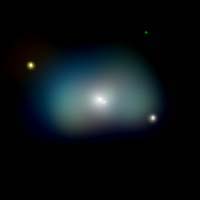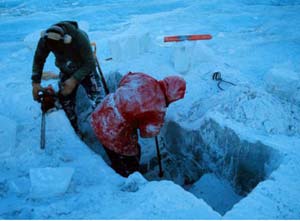
Museum curators and researchers who need to view historical artefacts or works of art in museums and galleries such as the Louvre, the Uffizi and London’s National Gallery, should be able to save on their plane and train fares thanks to a unique project being undertaken by computer scientists at the University of Southampton.
The project, known as SCULPTEUR, involves building an advanced database to store three-dimensional representations of museum artefacts and works of art together wi

Researchers at the University of Sheffield have transformed ordinary polyurethane packaging foam into a superfoam that not only refuses to be crushed but also actually increases in thickness when stretched. Under the same stresses conventional foam loses its resilience and its protective qualities, so the superfoam’s benefits for the packaging industry are obvious.
The secret lies in a new “cooking” technique and in the cooking oil, which has to be organic; olive oil, for example, will do ni

Ohio University astronomers have discovered the largest disk of hot, X-ray emitting gas ever observed in the universe: At 90,000 light years in diameter, it’s about 100,000 times the size of any comparable object. The disk, spinning through a distant galaxy, is more than just an interstellar oddity, the researchers say. The object could offer new information about the way certain galaxies form and evolve.
About 20 percent of all galaxies are elliptical, the largest of the three types of ga

Researchers from Finland have found that the cholesterol-lowering agent gemfibrozil (marketed as Lopid and generics) greatly increases the concentrations of cerivastatin (Lipobay or Baycol) in blood. This finding explains the observed muscle toxicity of the gemfibrozil-cerivastatin combination. This potentially fatal adverse effect of cerivastatin led to the withdrawal of Lipobay/Baycol from the market.
The concentrations of Lipobay were increased on average 5-6-fold by Lopid, in some indivi

NSF-supported researchers drilling into Lake Vida, an Antarctic “ice-block” lake, have found the lake isn’t really an ice block at all. In the December 16 issue of the Proceedings of the National Academy of Sciences, the team reveals that Antarctic Lake Vida may represent a previously unknown ecosystem, a frigid, “ice-sealed,” lake that contains the thickest non-glacial lake ice cover on Earth and water seven times saltier than seawater.
Because of the arid, chilled environment in which i

How far up into the sky does the biosphere extend? Do microorganisms exist at heights of 40 km and in what quantity? To answer these questions several research institutes in India collaborated on a path-breaking project to send balloon-borne sterile “cryosamplers” into the stratosphere. The programme was led by cosmologist Professor Jayant Narlikar, Director of the Inter University Centre for Astronomy and Astrophysics in Pune, with scientists at the Indian Space Research Organisation and the Tata In

Quantum defects have the potential to act as ultra-sensitive sensors that could offer new kinds of navigation or biological sensor technology. One type of these defect systems, nitrogen vacancy (NV)…

Breakthrough non-invasive technology for imaging through scattering media. Researchers introduce image-guided computational holographic wavefront shaping, offering fast and versatile solutions for complex imaging challenges. New study introduces a novel computational…

Modern astronomy has clung to the belief that the relativistic outflows or jets responsible for the existence of electromagnetic radiation of particularly high energies are located in the nuclei of…

In a pilot study, researchers at the University of Zurich have used artificial intelligence to detect antibiotic resistance in bacteria for the first time. This is an important first step…

New Method for Measuring Luminescence Lifetime. Researchers at the Max Planck Institute for Marine Microbiology, Leibniz-Institute for Baltic Sea Research and University of Copenhagen introduce an innovative approach to image…

UFZ study demonstrates for the first time the toxicological relevance of chemical mixtures as they occur in humans. “In our everyday lives, we are exposed to a wide variety of…

… and thermal post-treatment of flexible ultra-thin glass. Ultra-thin glass offers great potential for modern high-tech applications. Despite its superior properties compared to polymer films, the material has not yet…

Conventional catalysts for hydrogen production via water electrolysis usually contain precious metals and are expensive. However, cheaper alternatives have been developed, for example cobalt-manganese catalysts. They have a high activity…

The European Commission’s targets are ambitious: the ReFuelEU Aviation Regulation stipulates a 60 percent reduction in CO₂ emissions from aviation by 2050 compared to 1990 levels. A comprehensive EU Space…

New photonic computing method uses electromagnetic waves to solve partial differential equations rapidly. In the fields of physics, mathematics, and engineering, partial differential equations (PDEs) are essential for modeling various…

Neuroscientists show how fine motor skills of neural prostheses can be improved. Researchers at the German Primate Center – Leibniz Institute for Primate Research in Göttingen have developed a novel…

The TUM and the Pfennigparade Foundation have started a three-year research collaboration. The research will focus on the potential of robotics and AI-based technologies to help people with motor disabilities…